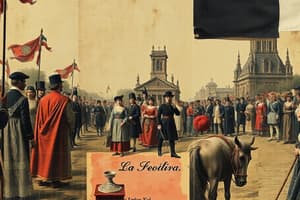Podcast
Questions and Answers
Which of the following best describes how the Estates General contributed to the onset of the French Revolution?
Which of the following best describes how the Estates General contributed to the onset of the French Revolution?
- By reinforcing the power of the monarchy and suppressing revolutionary sentiments.
- By fairly resolving the grievances of all three estates, thus preventing unrest.
- By ensuring the nobility and clergy paid their fair share of taxes, easing the financial burden on the Third Estate.
- By providing a platform for the Third Estate to voice their demands for fair treatment and reforms. (correct)
How did the social structure of pre-revolutionary France contribute to the French Revolution?
How did the social structure of pre-revolutionary France contribute to the French Revolution?
- The King implemented reforms that gradually leveled the playing field between the estates, satisfying the Third Estate's demands.
- The balanced distribution of wealth and privileges among all three estates fostered harmony.
- The nobility and clergy shared their privileges and exemptions with the Third Estate.
- The stark inequalities between the privileged First and Second Estates and the burdened Third Estate fueled resentment and demands for change. (correct)
What was the main purpose of convening the Estates General in 1789 by King Louis XVI?
What was the main purpose of convening the Estates General in 1789 by King Louis XVI?
- To celebrate the achievements and prosperity of the French monarchy.
- To address the economic crisis in France and seek solutions to the country's financial problems. (correct)
- To declare war on neighboring countries and expand French territories.
- To suppress revolutionary movements and maintain the absolute power of the monarchy.
What was the most significant long-term impact of the French Revolution on Europe?
What was the most significant long-term impact of the French Revolution on Europe?
How did the Reign of Terror impact the course of the French Revolution?
How did the Reign of Terror impact the course of the French Revolution?
What issue most directly prompted the Third Estate to separate from the Estates General and form the National Assembly?
What issue most directly prompted the Third Estate to separate from the Estates General and form the National Assembly?
How did the execution of King Louis XVI affect the course of the French Revolution?
How did the execution of King Louis XVI affect the course of the French Revolution?
Which of the following factors was the most significant cause of the financial crisis in pre-revolutionary France?
Which of the following factors was the most significant cause of the financial crisis in pre-revolutionary France?
Flashcards
Three Estates
Three Estates
The division of French society into clergy, nobility, and commoners.
Taille
Taille
A land tax in France that burdened the common people.
Estates General
Estates General
A representative assembly of the three estates convened by the king.
Reign of Terror
Reign of Terror
Signup and view all the flashcards
Execution of King Louis XVI
Execution of King Louis XVI
Signup and view all the flashcards
Social Inequality
Social Inequality
Signup and view all the flashcards
Principles of the Revolution
Principles of the Revolution
Signup and view all the flashcards
Napoleon Bonaparte
Napoleon Bonaparte
Signup and view all the flashcards
Study Notes
The French Revolution: Causes, Events, and Consequences
- The French Revolution was a period of major political and social change in France. It challenged the existing social order and aimed for a more just society.
The Three Estates
- French society was divided into three estates:
- First Estate: Clergy (Church members)
- Second Estate: Nobility
- Third Estate: Peasants, commoners, and everyone else (vast majority)
Taxation and Unrest
- French citizens faced heavy taxation, especially the Third Estate.
- The "Taille" (land tax) was a significant financial burden on the Third Estate.
- Growing dissatisfaction with the unequal tax system led to unrest among the common people.
The Estates General
- The Estates General was a representative body for the three estates in France.
- It was convened by King Louis XVI in 1789 to address the economic crisis.
- The event represented an attempt at addressing the political grievances of the different estates in France.
Causes of the French Revolution
- Bad Harvests and Rising Prices: Poor harvests led to widespread hardship and rising bread prices.
- Desire for Social Change: The Third Estate demanded equality and an end to the privileges of the nobility and clergy.
Events of the French Revolution
- (No specific events listed in the provided text)
The Reign of Terror
- The Jacobins, a radical group, seized power during the National Convention.
- The Reign of Terror was a violent period marked by the harsh punishment of those who opposed the revolution.
Execution of King Louis XVI
- King Louis XVI was executed in January 1793 for treason.
- This execution was carried out by the National Assembly after the King's attempted escape and efforts to regain power.
Living Conditions Before the Revolution
- Life in pre-revolutionary France exhibited significant disparities between the estates.
- The nobility and clergy had privileges and exemptions from taxation.
- The common people faced heavy financial burdens and social inequality.
Consequences of the Revolution
- The French Revolution led to far-reaching consequences.
- It led to the rise of Napoleon Bonaparte.
- The monarchy was abolished.
- Principles of liberty, equality, and fraternity became central values.
- The revolution inspired movements for change across the world.
- The revolution significantly altered the political and social landscape of France.
Studying That Suits You
Use AI to generate personalized quizzes and flashcards to suit your learning preferences.
Related Documents
Description
Explore the French Revolution's causes, including the rigid Estate system and heavy taxation on the Third Estate. Learn about key events and the social and political changes that reshaped France. Understand the revolution's impact on French society.




